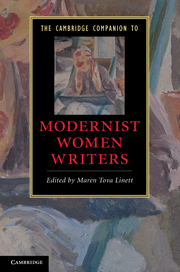Book contents
- Frontmatter
- Modernist women’s literature: an introduction
- 1 Transforming the novel
- 2 Modernist women poets and the problem of form
- 3 Women’s modernism and performance
- 4 Magazines, presses, and salons in women’s modernism
- 5 Gender in women’s modernism
- 6 Black women’s modernist literature
- 7 Race and ethnicity in white women’s modernist literature
- 8 Geomodernism, postcoloniality, and women’s writing
- 9 Women modernists and visual culture
- 10 Modernism and trauma
- 11 Political activism and women’s modernism
- 12 Religion and the occult in women’s modernism
- Guide to further reading
- Index
1 - Transforming the novel
Published online by Cambridge University Press: 28 November 2010
- Frontmatter
- Modernist women’s literature: an introduction
- 1 Transforming the novel
- 2 Modernist women poets and the problem of form
- 3 Women’s modernism and performance
- 4 Magazines, presses, and salons in women’s modernism
- 5 Gender in women’s modernism
- 6 Black women’s modernist literature
- 7 Race and ethnicity in white women’s modernist literature
- 8 Geomodernism, postcoloniality, and women’s writing
- 9 Women modernists and visual culture
- 10 Modernism and trauma
- 11 Political activism and women’s modernism
- 12 Religion and the occult in women’s modernism
- Guide to further reading
- Index
Summary
As critics and creative writers, modernist women actively transformed the novel to reflect their unique perceptions of everyday life. These included experiences of modernity, with its urban, technological, and cross-cultural developments; colonialism, with empires in decline; national, racial, and ethnic differences; and biased systems of gender and sexuality. While the ideals and exemplars of male modernism received imbalanced critical attention well into the 1980s, women were very much involved in the making of various modernist genres, including the novel, and they engaged in their own formal and thematic experimentation. Women had remarkable networks, facilitating one another's work through literary circles, publishing and editing endeavors, and the writing of criticism and reviews. Their work tested boundaries, reaching varied audiences, blending genres to create poetic novels and fictionalized essays, and accommodating fantasy, the unconscious, and madness into modernist writing. / A change in consciousness: 1900-19 / May Sinclair (1863-1946) is probably best known today for assigning the “stream of consciousness” style to another woman novelist, Dorothy Richardson. Describing the thought process of the central character in Richardson's Pilgrimage, Sinclair finds that “the moments of Miriam's consciousness pass one by one, or overlapping; moments tense with vibration, moments drawn out fine, almost to the snapping-point.”
- Type
- Chapter
- Information
- The Cambridge Companion to Modernist Women Writers , pp. 17 - 32Publisher: Cambridge University PressPrint publication year: 2010
- 1
- Cited by



